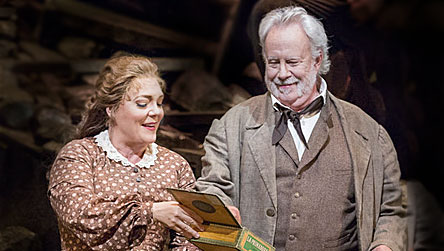
Review: Faith, Hope, and Jealousy in the Wild West
Virginia Opera’s production of La Fanciulla del West
Review by Tim Smith
“THE EMOTIONS FUELING THE PLOT of La Fanciulla del West—unfulfilled sensual needs, homesickness, sense of duty and community, those old favorites of faith, hope and jealousy—were all given serious, sincere attention in a Virginia Opera production that reaffirmed, as admirers of Puccini’s brilliant work have long maintained, it deserves much more prominence in the canon. Aided at every moment by Adam Greene’s refined lighting, there was no shortage of good old-fashioned atmosphere from the scenery (John Conklin) and costumes (Constance Hoffman), originally designed for the Glimmerglass Festival. The director of that earlier production, Lillian Groag, brought her incisive touch to this staging as well, lavishing attention on the smallest detail so that everyone in the story, down to the last miner, revealed distinctive actions and reactions. Groag’s imaginative approach proved particularly rewarding in the final act. It began with the arresting sight of a drunken, sullen Rance flicking playing cards, one by one, into a fire, and went on to show Minnie making her rescue mission with help from armed confederates, including Wowkle, and getting wounded by a gunshot from a nervous miner.
On December 3, at George Mason University’s Center for the Arts, Jill Gardner performed the title role with considerable flair. The soprano had sufficient power for the big, upper-reach moments, but it was the rest of her singing that really impressed, the tone tender, the phrasing thoroughly natural. She proved a knowing actress, too, capable of making the character seem totally believable from the get-go; she did especially disarming work in in the bible-reading passage. As Johnson, Roger Honeywell did not measure up to Gardner vocally. The tenor had no low register to speak of, a dry mid-range, and top notes that lunged out awkwardly. But there were redeeming compensations from his vibrantly communicative phrasing and his dramatic nuance; the sureness of his acting made even little moments, such as the waltzing scene with Minnie, register deeply. Mark Walters revealed a sturdy, supple baritone as Rance. His finely drawn portrayal ensured that the character came across as much more layered than a standard villain.
The leather in Jake Gardner’s bass-baritone gave his dynamic portrayal of Ashby an authoritative ring. Firm, colorful singing came from Chris Carr (Nick), Stephen Carroll (Harry), Joshua Arky (Jake Wallace, here depicted as a blind man guided by a boy) and Melisa Bonetti (Wowkle). The choristers did not always maintain a smooth blend, but phrased ardently. Conductor Andrew Bisantz shaped the score with an effective balance of propulsion, tension (the poker scene had quite an electric charge) and lyrical breadth, drawing confident playing from the orchestra throughout.”
Photo by Ben Schill Photography; courtesy of Virginia Opera.
